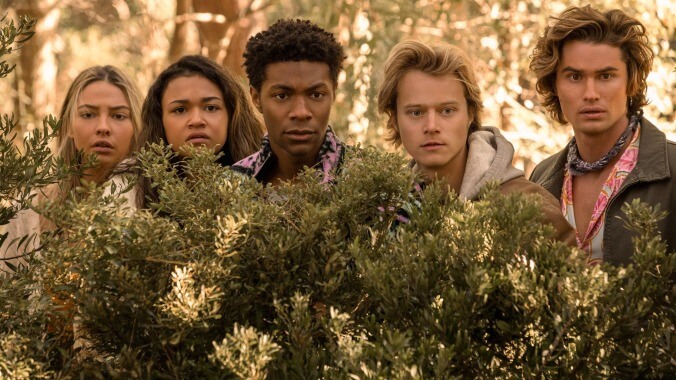Like its protagonists, Outer Banks season 2 is dumb but fun
The show's second season adds another treasure hunt and more seaside towns

“Stupid things have positive outcomes all the time.” This is the motto of J.J. (Rudy Pankow), a member of the Pogues, the have-not townies of Netflix teen adventure drama Outer Banks. This sentence could also work as the unofficial mantra of the show itself. Watching the series requires turning off part of your brain lest you start ruminating on plot leaps that threaten to shred your enjoyment. If you can do that (maybe shotgun a beer or two, just like the Pogues do!) and squint a little bit, Outer Banks can offer a downright thrilling ride.
In season one, Pogues John B. (Chase Stokes), Kiara (Madison Bailey), Pope (Jonathan Daviss), and J.J. were on the hunt for half a billion dollars in gold bars. They were supposedly discovered by John B.’s recently deceased dad, who we found out was killed by Ward (Charles Esten, excellent as always), the father of John B.’s new rich girlfriend Sarah (Madelyn Cline). The gold bars remain in play this season, as John B. and Sarah are still on the run after Ward framed John B. for the murder of a local cop. But mid-season another $500 million treasure connected to this North Carolina region pops up (what are the odds?), this time tied to Pope, as a formerly enslaved ancestor of his ran away with a priceless artifact and socked it away several decades prior.
Coincidences like these emerge throughout Outer Banks and threaten to take the viewer out of the action. John B. and Sarah start the season on the lam in the Bahamas while the other Pogues are still in the Outer Banks, but eventually they all run into each other on the street of a different coastal city altogether. Another acquaintance shows up on a freighter in the middle of the goddamn ocean. These types of contrivances may make things flow a lot smoother in the writers’ room, but the plot jumps are often ludicrous.
The Pogues themselves can also be filed under the “less than logical” category. Granted, they’re teenagers (played across the board by twentysomethings) who mostly have absentee (for John B. and J.J.) or homicidal (in Sarah’s case) parents. They don’t see much of a future past hanging out with their four best friends and passing a joint around a beach bonfire, which helps explain the appeal of hundreds of millions of dollars. But some of their choices are so dumb as to be eyeroll-inducing: If the cops and who knows who else are after you, why have a hot tub party and put a beer box on your head? Some of the gang’s proposed plots are so outlandish that savvier kids probably wouldn’t attempt them in the first place, so the Pogues’ innocence and gosh-darn pluck occasionally works in their favor.
The series does an effective job of raising those stakes: In a blood-pressure-raising segment, one kid is fighting a gator, one is close to drowning, and one is getting chased by the cops. It’s hard to see a clear way out for any of them, but Pogues being Pogues, they manage to escape with their lives. Always just barely: There are way too many unlikely coming-back-from-the-brink-of-death sequences for these characters in one 10-episode season. One second a character who’s suffered a gunshot wound needs help getting down some stairs, the next they’re off on a boat by themselves. John B. faces the death penalty for that murder rap, even though he’s only 17. Also unrealistic: Although the show is set in North Carolina (and shot in Charleston), no one has a southern accent, except for the occasional town crony—not even Lost’s Elizabeth Mitchell, who enters the fray like a mid-century matriarch who’s wandered off from a Tennessee Williams summer stock production, another member of the southern elite looking for Pope’s family treasure.
But this is exactly the kind of nitpicking that threatens the fun of the show overall, because the Pogues’ journeys from point to point on that treasure map are really rather breathless. There’s a late-season scene on a large freighter that resembles Die Hard on a ship. The chases on both land and sea are impressive, as the Pogues battle everything from psychopathic siblings to rising tides to wasps’ nests over the course of the season.
Occasionally Outer Banks tries to aim for loftier statements about the class system, or the concept of family—specifically, your friends becoming your family (a necessity in Sarah’s case, as her actual relatives are beyond toxic). Both girls have wince-inducing standoffs with their families along the lines of “Mom, Dad, you just don’t get it! I’m a Pogue now!” But the series needn’t bother. There’s a familial-enough chemistry among the young attractive cast to make those bonds ring true, if occasionally hokey. The romances don’t quite fare as well (although Sarah and John B.’s connection is likely aided by the actors’ real-life relationship), but Cline nails the role of the teen girl who’s in danger far more often than not. Ultimately, though, the real draw of Outer Banks is its sense of fun and outlandish adventure—like an older Goonies with more death-defying stakes attached. As someone once said, stupid things have positive outcomes all the time.